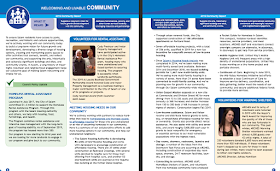By Sarah Owens and Michael Livingston
 |
| Ex-Wallace-Marine Park area campers have moved to downtown |
Based on reports of group fights fueled by intoxication spilling into traffic, frequent domestic violence episodes, and prolonged bouts of incoherent yelling, it's a rough and vulnerable group that's moved on to the parking strips by the ARCHES Project property, across Union Street from the chemical toilets in Marion Square Park.
ARCHES Project staff and partners assessing campers have found that a substantial number are likely to score high on the vulnerability index and will qualify for HRAP. One individual had lived in the WMP area for 16 years before being rousted by police.
 |
| Camps along the rail line (11/16/19) next to Marion Street Bridge |
The camps on parking strips are fueling support for Ordinance Bill 10-19, which would ban camping on City property when it takes effect. The big question on everyone's mind is, where can these people go?
As always happens, the camps downtown have renewed awareness (or maybe anger is a better word) and a sense of urgency about the problem. Local businessman Larry Tokarski held a four-hour, VIP homelessness "summit" last week, reportedly to "get everyone on the same page", whatever that might mean. See Brynelson, T. "Local leaders meet to talk homelessness." (November 15, 2019, Salem Reporter.)
Based on Salem Reporter's account, the page looks something like the one at right.
Wherever would we be without business leaders to get us on the same page?
One of the stranger lessons to come out of the Good Neighbor Partnership is that business leaders often prefer to focus on what is sometimes referred to as "managing homelessness" versus finding out what's needed to get people stably housed, even though the former is far and away more resource intensive.
By "managing homelessness" is meant doing what it takes to meet people's basic needs despite their not having a decent and stable place to live.
 |
| The Good Neighbor Partnership met 11/13 at SHA |
Maybe our business leaders are not as smart as they or we think they are? Or as generous? Or maybe, just maybe, things are every bit as happy and forward looking as the City's 2019 Community Report would suggest, and everything's as it should be?
 |
| City of Salem's 2019 Community Report, page 4 |
 |
| City of Salem 2019 Customer Satisfaction Survey |
Finally, with all the news there's been about Ordinance Bill 10-19 (aka Sit-Lie, Jr. or the Sidewalk Behavior Ordinance), we've not reported on the August training event organized by United Way of the Mid-Willamette Valley called "Humanizing Homelessness." United Way described it as "A training opportunity for local business owners and their staff to acquire better skills for positive outcomes for interactions with homeless people." The training was sponsored by Chemeketa Center for Business & Industry, The Governor's Cup Coffee Roasters and US Bank. There was a morning and evening session. We went to the morning session, which was well attended and well received, though overshadowed by the looming prospect of sit-lie making enforcement the preferred "tool" for downtown businesses facing difficult situations. United Way currently has no plans for future trainings.
 |
| From L: Elizabeth Schrader, Kevin Hill, Breezy Aguirre, Phyllis Martin, Kim Hanson |

I've been pondering the topic of managing homelessness vs. solving homelessness a lot lately.
ReplyDeleteProviding food as basic nourishment, clothing as basic hygiene and warmth, safe sleep as a basic human need that enables some deep rest.... none of those things directly solve homelessness, yet each of those things enable some ease, breathing room, a small respite from ongoing survival mode.
When there's some breathing room, people are more likely to grow hope, build trust and relationships, and find spoons to connect with services and supports that may lead to them moving forward and becoming housed.
If those managing-homelessness supports are not reducing solving-homelessness dollars, it seems like the two can coexist, and the former can enable the latter.
The question is one of policy. In terms of policy, what you're really saying is, please let us keep doing what we like to do, what's within our budget and skill set (both minuscule), what's comfortable and familiar, what makes us feel good about ourselves, rather than put all energy and resources into professional services and programs that we know will work. Continue piecemeal efforts and dogoodery. Path of least resistance, preserve ineffective institutions and programs, and forget about who really suffers because we won't make hard policy choices. You are kidding yourself if you think amateur supports "enable" people to be stably housed.
Delete